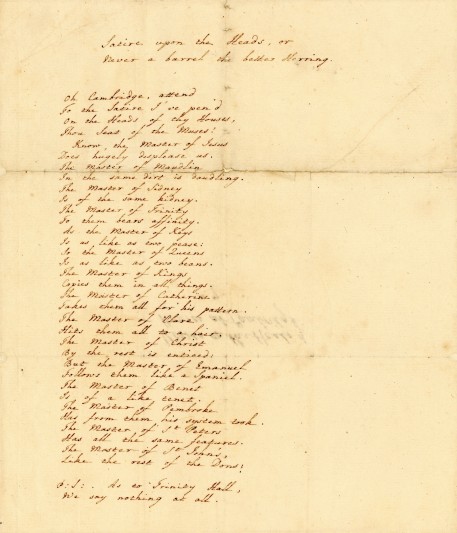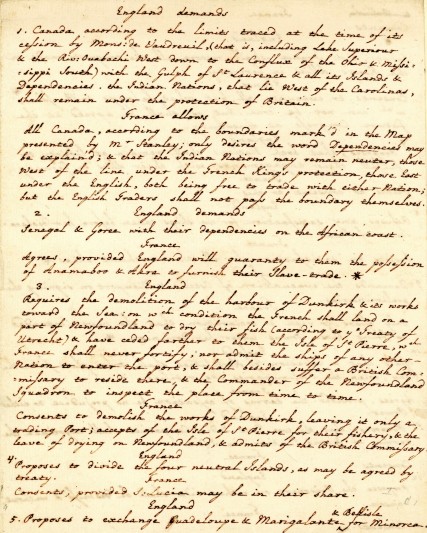The generous assistance of the Friends of the National Libraries has enabled Peterhouse to acquire two lots at auction that derive from the collection of literary manuscripts assembled by Richard Monckton Milnes, 1st Baron Houghton (1809-1885), many of whose papers are now held by Trinity College, Cambridge. Each lot consists of original manuscript leaves which have been mounted for binding in a volume or scrapbook and subsequently disbound. Evidence from earlier foliation suggests that the two poems were originally bound sequentially early in one volume and the sets of reading notes were together as part of a second volume.
The lots comprise manuscripts written by the poet Thomas Gray (1716-1771), who studied at Peterhouse from 1734 and became a Fellow of the College. Lot 31 is the autograph of a ‘Satire on the Heads of Houses; Or, Never a Barrel the Better Herring’ (first published in 1884 and otherwise known from a transcript with a different title in the hand of John Mitford, BL MS Add. 32561, fols 186-7: details in Index of English Literary Manuscripts, vol. 3, part 4: GrT120 (this manuscript) and GrT121 (the transcript)). The poem is printed in the standard edition of Gray’s poems, edited by H.W. Starr and J.R. Hendrickson (Oxford, 1966), based on its publication by Gosse in 1884. The editors note that it is difficult to date and their text is in fact frequently in error, particularly with reference to spelling and punctuation, when compared with the autograph, which was bought by Monckton Milnes in 1854. The poem has clear Cambridge interest, rhyming in virtuoso fashion the name of each of the Colleges of the University. Gray begins: ‘Oh Cambridge, attend/ To the Satire I’ve pen’d/ On the Heads of thy Houses/ Thou Seat of the Muses!’ and there follow 16 couplets, each treating another Master, each said to be equal in their awfulness: ‘The Master of Pembroke/ Has from them his system took/ The Master of St Peters/ Has all the same features.’ The poem ends: ‘As to Trinity Hall/ We say nothing at all.’
The second lot (lot 32) contains two sets of notes by Gray on the terms of the Treaty of Paris (1763) and on the rulers of India in approximately 1764. These are typical of the reading notes that Gray made in his various commonplace books, several of which are otherwise held in Cambridge (notably at Pembroke College). The two entries are unpublished, but known from previous sales (GrT257 and GrT230 respectively). The lot also contains a copy of Gray’s translation from Canto 33 of Dante’s Inferno. This is not in Gray’s hand. It was the source for the first publication of the verses in full in 1884, but was not available to Starr and Hendrickson, who confuse it with the transcript by Mitford (BL MS Add. 32562, fol. 29; GrT139). It was in fact the basis for Mitford’s transcription (since he notes that the version that he copied was not in Gray’s own hand), and can be identified through Mitford’s notes as being in the hand of Gray’s friend Richard Stonehewer. It is thus the primary surviving text for the poem and again corrects the version offered by Starr and Hendrickson in a number of places.
The manuscripts represent a significant addition to Peterhouse’s holdings of autograph and original pieces by Gray, and belong naturally in Cambridge with other like materials held elsewhere in the University.

